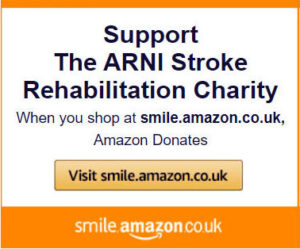What is stroke rehabilitation? It is a lifelong process of working to achieve a best possible level of functioning.
Wherever you are, or would like to be, in your recovery; we can help you. We have trainers throughout the country. Call us on 0203 053 0111 or email support@arni.uk.com to find out if there's a trainer near you who can help you.
www.arni.uk#stroket#strokesurvivorsi#neuroplasticityi#strokerecoveryo#strokerehabilitationation
... See MoreSee Less
THE LATEST STROKE RECOVERY NEWS INCL. Functional Independence Via Paired Vagus Nerve Stimulation -
... See MoreSee Less
Christine just asked a great question to us: why don't we hear more of trials featuring haemorrhagic stroke? It's a great question; and I don't know the best answer - but I do know of some 5 RCTs that have taken place focused on haemorrhagic stroke in the last 3 years in the UK alone:
DASH: Desmopressin for reversal of antiplatelet drugs in stroke due to haemorrhage. This trial evaluates whether desmopressin can reduce haematoma expansion in patients who were taking antiplatelet medication before their intracerebral haemorrhage.
RESTART: REstart or STop Antithrombotics Randomised Trial. Although the main results were earlier, recent high-impact long-term follow-up data (published 2021–2024) confirmed the safety of starting antiplatelet therapy for survivors of intracerebral haemorrhage who have a separate indication for it.
SoSTART: Effects of Oral Anticoagulation after Stroke with intracerebral haemorrhage in patients with Atrial Fibrillation. Similar to RESTART, this UK trial has provided recent evidence regarding the safety of resuming anticoagulation in haemorrhagic stroke patients with atrial fibrillation.
TICH-2/TICH-3: Tranexamic acid for hyperacute primary IntraCerebral Haemorrhage. While TICH-2 concluded its primary phase, the platform and subsequent analyses (TICH-3 and international collaborations) remain major UK-led efforts examining antifibrinolytic therapy to limit brain bleeding.
ALN-APP Study: A recent 2025 trial specifically recruiting at UK sites (like UCLH) to test an investigational drug for Cerebral Amyloid Angiopathy (CAA), a leading cause of recurrent haemorrhagic stroke.
w#ARNIstrokerehabA#HaemorragicStrokeemorragicstroke
... See MoreSee Less
The UK has officially entered a global clinical trial assessing DM199, a pioneering recombinant protein designed to improve neurological recovery following an acute ischaemic stroke. 🏥
The North Midlands Clinical Research Delivery Centre, based at the University Hospitals of North Midlands NHS Trust, has successfully recruited the nation's first patient into the ReMEDy2 study at Royal Stoke University Hospital. This research evaluates DM199, a synthetic version of the human tissue kallikrein-1 protein, which aims to enhance collateral blood flow and reduce inflammation within the brain’s delicate microvasculature. Such pharmacological advancements definitely aligns with ARNI Stroke Rehab UK's mission to support survivors in achieving the best possible physiological starting point for long-term retraining. 🧠
By participating in this global investigation, the North Midlands team is basically helping to determine if this therapy can effectively salvage brain tissue and minimise the long-term disabilities often associated with ischaemic events. The collaboration between the trust’s stroke service and its research and innovation teams ensures that UK survivors are at the forefront of biotechnological interventions designed to maximise neuroprotection. This integration of acute medical innovation and intensive rehabilitation remains essential for optimising the functional independence and quality of life for our stroke community. 🦾
www.arni.uk.com 🌐
#ARNIStrokeRehab #StrokeResearch #DM199 #RoyalStoke #Neuroprotection
... See MoreSee Less
A tragic inquest has highlighted the devastating impact that systemic clinical failures and fragmented communication can have on the safety of elderly stroke survivors during the critical transition from hospital to home. 🏥 We bet that some of our ARNI Stroke Rehab & Recovery readers have their own horror stories.. if you're up for sharing, please let us know in the comments below
Mary Powell, a 91-year-old grandmother, was originally admitted with pneumonia before being transferred to Ross-on-Wye Community Hospital for rehabilitation, where she was ultimately discharged on a Saturday without an electronic summary or the vital medication required to manage her stroke risk.
The inquest heard that her family, distressed by ward conditions, opted for an unplanned discharge but were unaware that her previous aspirin regimen had been replaced by a new anticoagulant for which they received neither a supply nor a prescription. This lack of clarity meant Mrs Powell went 20 days without the necessary blood thinners, a period during which her GP remained unnotified of the medication changes, highlighting a catastrophic breakdown in the 'hospital-to-home' care pathway. 🧠
For the ARNI Stroke Rehab UK Institute and Charity, this heartbreaking case underscores the absolute necessity of rigorous patient advocacy and the seamless integration of medical management with rehabilitation efforts. Ensuring that survivors and their families are fully empowered with clear, written discharge plans and immediate access to life-saving secondary prevention medication is as vital as the physical retraining itself. This story serves as a real reminder that we can only try as survivors to do our best in rehab if we have a healthcare system that prioritises safety - and ESPECIALLY communication - at every stage of the journey. 🦾
www.arni.uk.com 🌐
#ARNIStrokeRehab #StrokeSafety #PatientAdvocacy #HospitalDischarge #StrokeAwareness
... See MoreSee Less
All requests for a ARNI Instructor, handled by the ARNI Charity, are then passed for referral to Stroke Solutions www.strokesolutions.co.uk for professional administration and monitoring (each session, throughout the lifespan of all sessions). Stroke Solutions is the ARNI Charity's Referral and Monitoring Agency. This is a typical intro pack, posted to anyone enquiring for help with stroke rehab.
Call us on 0203 053 0111 or email support@arni.uk.com
www.arni.uk.#neuroplasticityi#strokeexerciser#strokerehabilitationa#neurorehabr#strokerecoveryo#exerciseafterstroket#strokerecoveryexercisescises
... See MoreSee Less
So, how do you best go about trying to resolve your drop-shoulder? What's the latest best practice /advice?? So, research indicates that dynamic neuromuscular stimulation represents the most effective one treatment option (probably not the best 'training option' or 'management option' options I can think of btw) for resolving post-stroke shoulder subluxation and associated hemiplegic pain 🧠.
To effectively self-treat sublux, survivors should try transitioninf from passive slings, which can potentially exacerbate muscle shortening and malalignment, toward active bracing such as the SaeboStim One for functional electrical stimulation ⚡.
By applying neuromuscular electrical stimulation to the posterior deltoid and supraspinatus, one creates a biological sling that utilises electrical pulses to physically re-seat the humerus into the glenoid socket. For superior structural integrity, dynamic supports such as te the GivMohr Sling (available on Amazon and from other sources) provides essential upward compression through a four-point harness that prevents the common issue of the arm sliding forward 🛠️. This stability allows for the high-repetition, neuroplasticity-driven task-specific training required to regain the physiological muscle tone needed to support the limb independently.
Advanced recovery would involve weaning off these devices through specialised ARNI-style training, like utilising Dr Tom's 'squat-chin' exercise, performed with feet on the floor, which challenge the outdated clinical dogma suggesting that all pulling movements are detrimental to subluxation 🏗️. Experience shows that subluxation typically recedes when the arm is moved strategically rather than being left to linger in a stat#ARNIstrokerehabm#strokerecovery.#shouldersubluxationh#neurorehabilitationS#physiotherapytion #Neurorehabilitation #Physiotherapy
... See MoreSee Less
The evidence base shows that you MUST perform some exercises routinely to help yourself to recover well. But what do you do? in the ARNI online video set Dr Tom Balchin shows you exactly what to do. A stroke survivor himself, he has built, via via over 18 years of teaching survivors and trainers evidence-based practice and creating innovative techniques, an internationally-respected approach to functional rehabilitation training after stroke which WORKS.
www.strokesolutions.co.uk/product-category/dvds/
#stroke #strokesurvivors #neuroplasticity #strokerecoverysuccess #strokedvd
... See MoreSee Less







